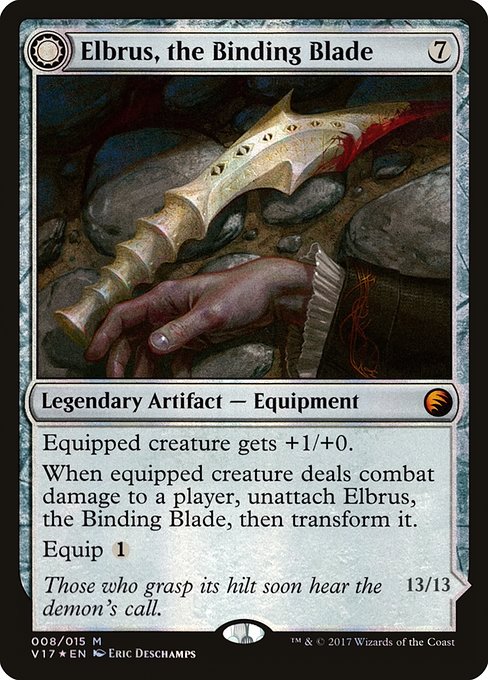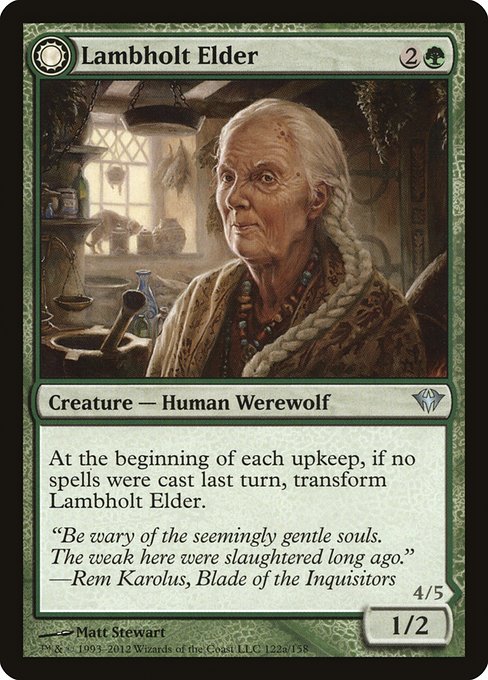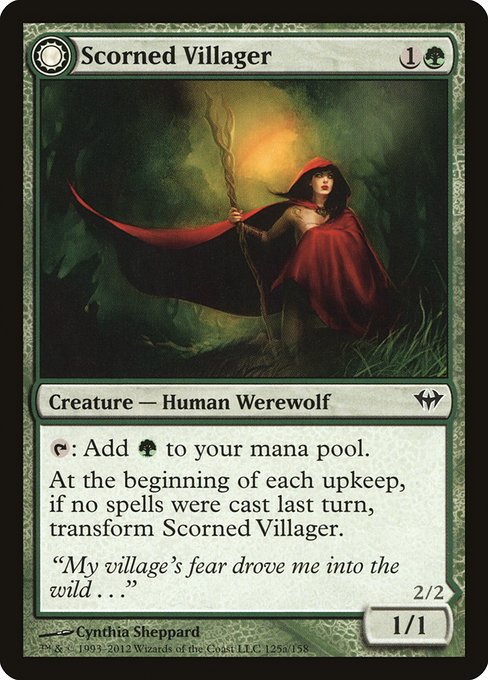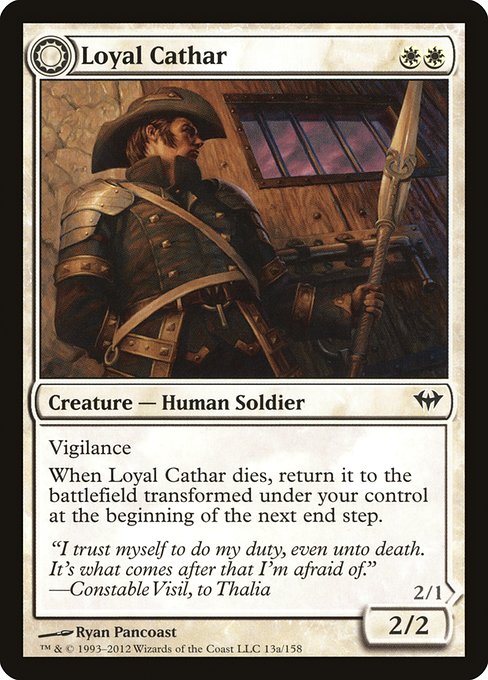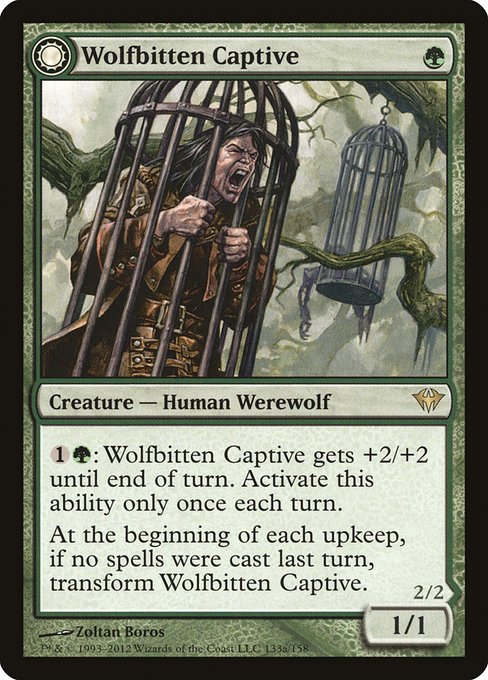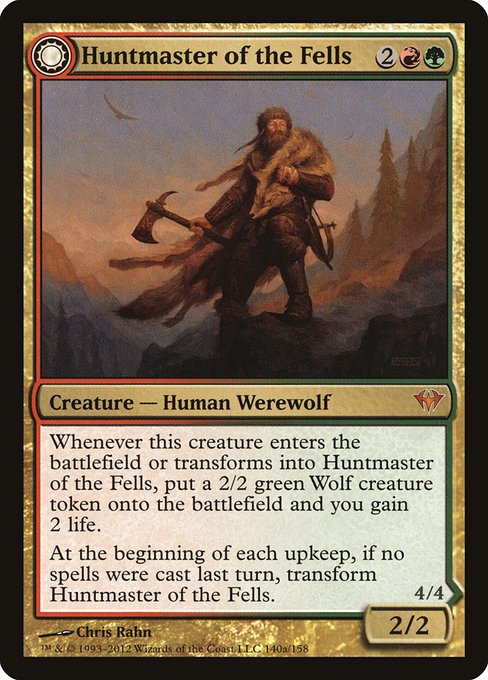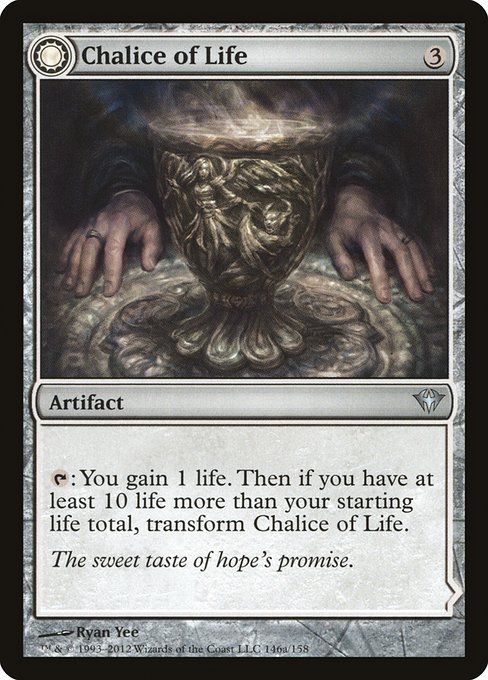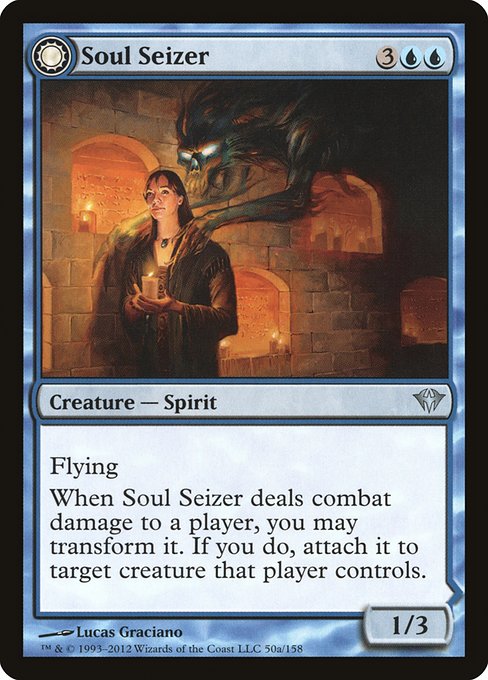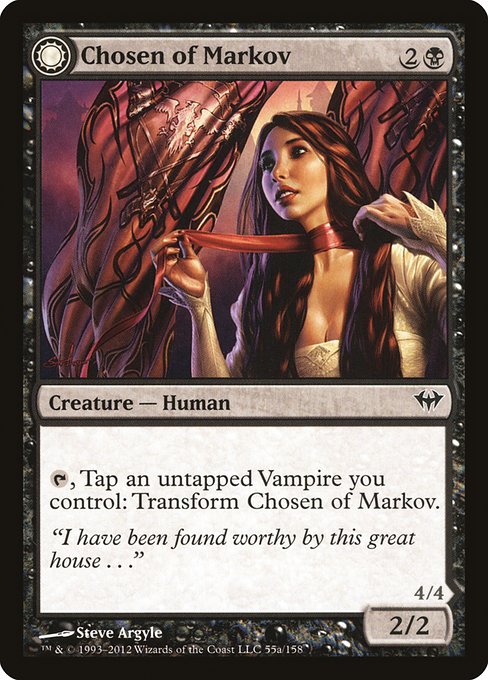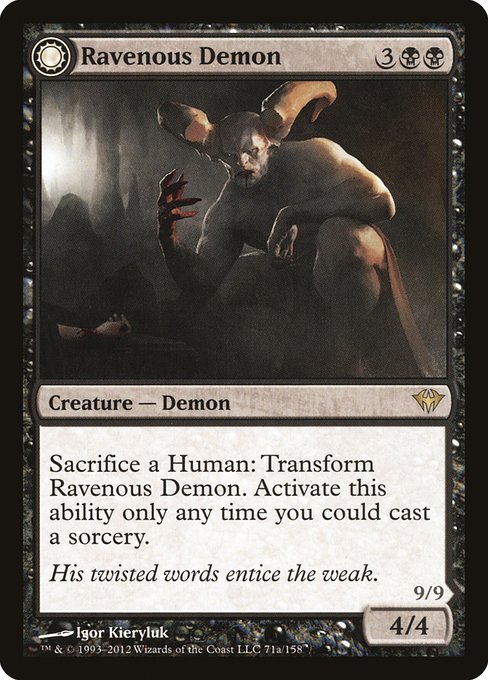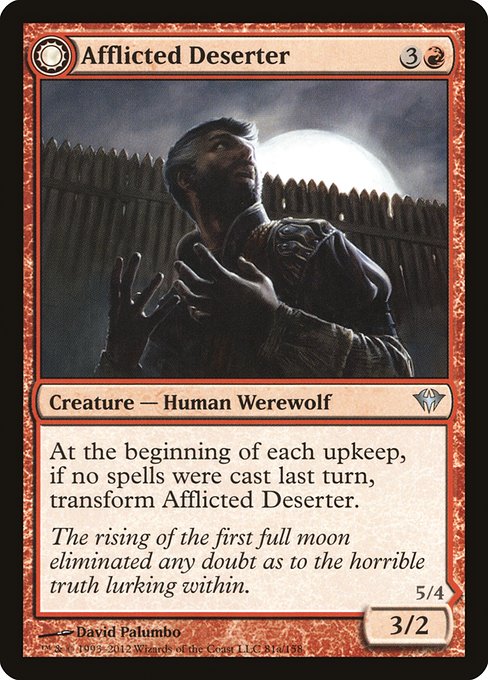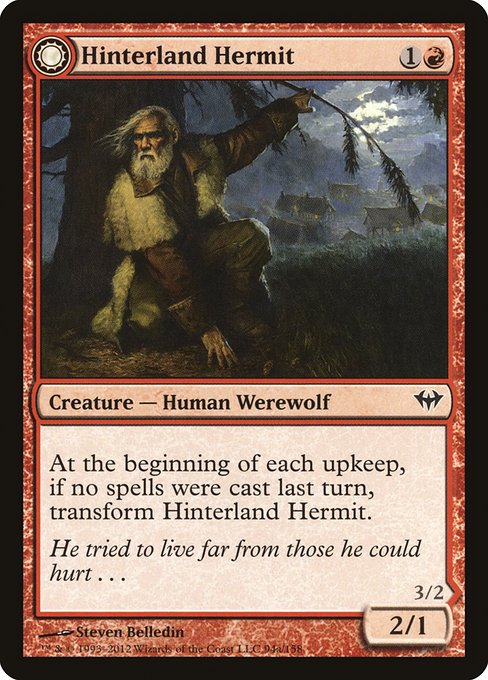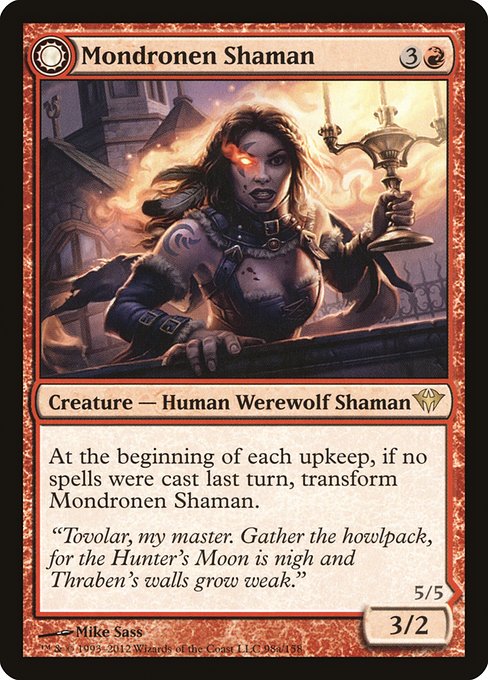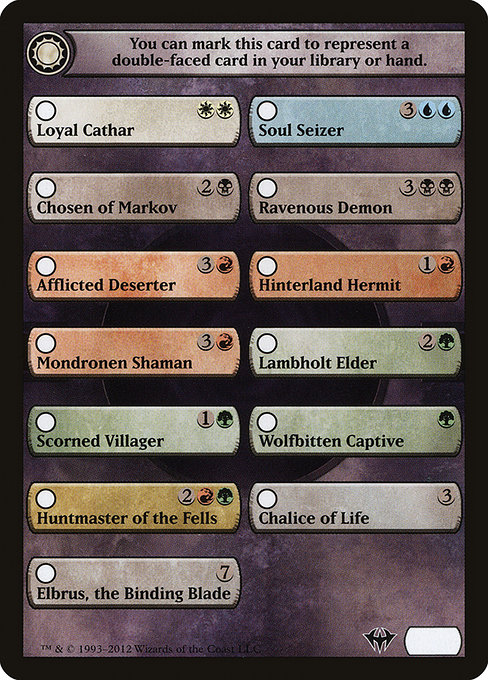Elbrus, the Binding Blade // Withengar Unbound
//
Legendary Artifact — Equipment // Legendary Creature — Demon
Equipped creature gets +1/+0.
When equipped creature deals combat damage to a player, unattach Elbrus, the Binding Blade, then transform it.
Equip // Flying, intimidate, trample (A creature with intimidate can't be blocked except by artifact creatures and/or creatures that share a color with it.)
Whenever a player loses the game, put thirteen +1/+1 counters on Withengar Unbound.
When equipped creature deals combat damage to a player, unattach Elbrus, the Binding Blade, then transform it.
Equip // Flying, intimidate, trample (A creature with intimidate can't be blocked except by artifact creatures and/or creatures that share a color with it.)
Whenever a player loses the game, put thirteen +1/+1 counters on Withengar Unbound.
13/13
standard
future
historic
gladiator
pioneer
explorer
modern
legacy
pauper
vintage
penny
commander
brawl
alchemy
paupercommander
duel
oldschool
premodern
Rulings
Elbrus will transform even if you are unable to unattach it (most likely because the equipped creature died).
The “legend rule” checks only for permanents with exactly the same name. Elbrus, the Binding Blade and Withengar Unbound can be on the battlefield at the same time without either going to its owner’s graveyard.
Withengar’s triggered ability will trigger no matter how a player loses the game: due to a state-based action (as a result of having a life total of 0 or less, trying to draw a card from an empty library, or having ten poison counters), a spell or ability that says that player loses the game, a concession, or a game loss awarded by a judge.
In a multiplayer game using the limited range of influence option (such as a Grand Melee game), if a spell or ability says that you win the game, it instead causes all of your opponents within your range of influence to lose the game. This is another way by which Withengar’s ability can trigger.
For more information on double-faced cards, see the Shadows over Innistrad mechanics article (http://magic.wizards.com/en/articles/archive/feature/shadows-over-innistrad-mechanics).
The “legend rule” checks only for permanents with exactly the same name. Elbrus, the Binding Blade and Withengar Unbound can be on the battlefield at the same time without either going to its owner’s graveyard.
Withengar’s triggered ability will trigger no matter how a player loses the game: due to a state-based action (as a result of having a life total of 0 or less, trying to draw a card from an empty library, or having ten poison counters), a spell or ability that says that player loses the game, a concession, or a game loss awarded by a judge.
In a multiplayer game using the limited range of influence option (such as a Grand Melee game), if a spell or ability says that you win the game, it instead causes all of your opponents within your range of influence to lose the game. This is another way by which Withengar’s ability can trigger.
For more information on double-faced cards, see the Shadows over Innistrad mechanics article (http://magic.wizards.com/en/articles/archive/feature/shadows-over-innistrad-mechanics).
Rulings
Elbrus will transform even if you are unable to unattach it (most likely because the equipped creature died).
The “legend rule” checks only for permanents with exactly the same name. Elbrus, the Binding Blade and Withengar Unbound can be on the battlefield at the same time without either going to its owner’s graveyard.
Withengar’s triggered ability will trigger no matter how a player loses the game: due to a state-based action (as a result of having a life total of 0 or less, trying to draw a card from an empty library, or having ten poison counters), a spell or ability that says that player loses the game, a concession, or a game loss awarded by a judge.
In a multiplayer game using the limited range of influence option (such as a Grand Melee game), if a spell or ability says that you win the game, it instead causes all of your opponents within your range of influence to lose the game. This is another way by which Withengar’s ability can trigger.
For more information on double-faced cards, see the Shadows over Innistrad mechanics article (http://magic.wizards.com/en/articles/archive/feature/shadows-over-innistrad-mechanics).
The “legend rule” checks only for permanents with exactly the same name. Elbrus, the Binding Blade and Withengar Unbound can be on the battlefield at the same time without either going to its owner’s graveyard.
Withengar’s triggered ability will trigger no matter how a player loses the game: due to a state-based action (as a result of having a life total of 0 or less, trying to draw a card from an empty library, or having ten poison counters), a spell or ability that says that player loses the game, a concession, or a game loss awarded by a judge.
In a multiplayer game using the limited range of influence option (such as a Grand Melee game), if a spell or ability says that you win the game, it instead causes all of your opponents within your range of influence to lose the game. This is another way by which Withengar’s ability can trigger.
For more information on double-faced cards, see the Shadows over Innistrad mechanics article (http://magic.wizards.com/en/articles/archive/feature/shadows-over-innistrad-mechanics).
Your collection? Your decks?
Want to manage your collection and/or create decks?
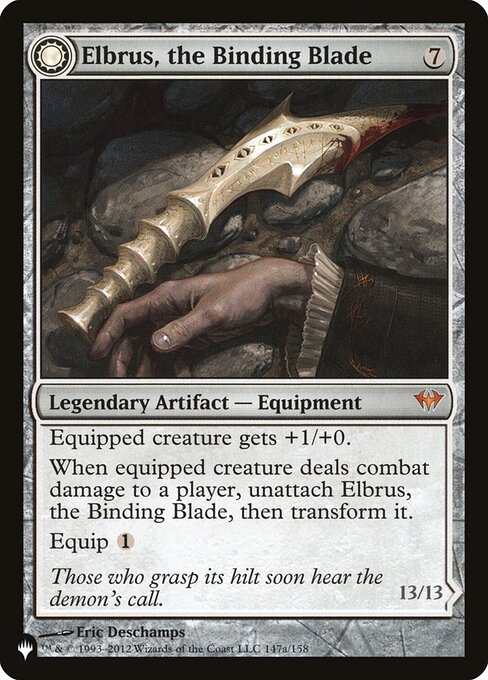

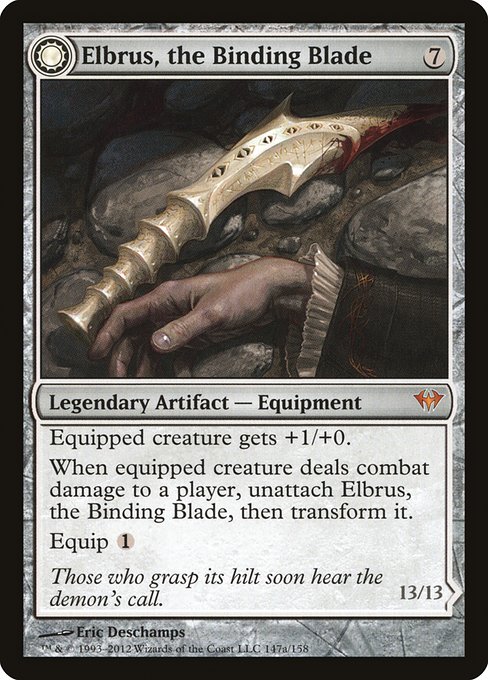
 0
0
 2.20€
2.20€
